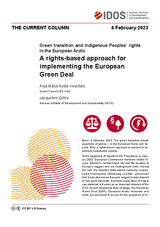Green transition and Indigenous Peoples’ rights in the European Arctic
A rights-based approach for implementing the European Green Deal
Nystø Keskitalo Anja Márjá / Jacqueline GötzeThe Current Column (2023)
Bonn: German Institute of Development and Sustainability (IDOS), The Current Column of 6 February 2023
Bonn, 06 February 2023. The green transition entails questions of justice – in the European Arctic and beyond. Why a rights-based approach is needed to implement sustainable policies.
At the beginning of Sweden’s EU Presidency in January 2023, European Commission members visited Kiruna, Sweden’s northernmost city and the location of Europe’s biggest iron ore underground mine. During the visit, the Swedish state-owned company Luossavaara-Kiirunavaara Aktiebolag (LKAB) announced that it had discovered Europe's largest known deposit of rare earth elements. Domestic exploration of critical raw materials is framed as an important element of the EU's current decarbonisation strategy, the European Green Deal (EGD). European Arctic resources and lands are perceived to be key for the expansion of renewables and, by that, for reducing emissions and external energy dependency. These types of land use can negatively impact other forms of land use, which is currently insufficiently addressed in the EGD. Since the European Arctic is also home to Indigenous peoples, the EU needs to develop a rights-based approach for implementing the EGD to ensure Indigenous self-determination and rights to land also within Europe.
Globally, the EU is presenting itself as a leader in combating climate change and promoting Indigenous Peoples’ rights in the Arctic and beyond. The reference to the pioneering role of the EU in these respects is even used as a justification for EU’s engagement in the Arctic in the first place, also with regard to its own economic and ecological footprint in the region. What is often missing in these arguments is that solutions to tackle climate change such as the promotion of renewables and technical innovations can also harm Indigenous Peoples, as increasing land encroachments can result in more land use conflicts in the Arctic. Partly in the European Arctic, Sápmi stretches across today’s northern parts of Norway, Sweden, Finland and Russia (Kola Peninsula). Sápmi is the traditional homeland of the Sámi, the only Indigenous People in the EU. Sámi are rights-holders in the European Arctic: the respective nation-states and the EU itself are obliged to follow international standards on Indigenous rights. One key document in this regard is, for instance, the United Nations Declaration on the Rights of Indigenous Peoples (UNDRIP) (2007) that introduced the FPIC principle (Free, Prior, and Informed Consent) – a relevant principle addressing Indigenous self-determination in the context of development projects. However, there is a discrepancy between the EU´s internal and external policies towards Indigenous Peoples. Even though the EGD reflects on potential negative spillover effects of EU policies on Indigenous Peoples, it still lacks an EU-internal view. As most Sámi people are citizens of the EU or the European Economic Area (EEA), the overall development policy framework for Indigenous Peoples under the European Instrument for Democracy and Human Rights (EIDHR) does not apply to them.
Since there is currently no EU-internal Indigenous Peoples’ policy in place, it depends on the policy and the personnel in charge of a policy field or the respective institution whether Sámi representatives are included in policy processes or not. They also determine the quality and intensity of participation and inclusion. This observation goes very much in line with other analyses, which are stressing the role of individuals when it comes to the EU Arctic policy at large. The EU Arctic approach is described as mainly circumpolar with a lack of an internal and regional approach towards the European Arctic and its development, which is also true for the case of Indigenous Peoples’ rights in the European Arctic. Without a link between an internal Indigenous Peoples’ policy for the European Arctic and the EGD, the impacts of the EGD on Indigenous Peoples inside the EU cannot be addressed politically.
A missing EU internal Indigenous Peoples policy further hinders the possibility that the EGD can be implemented inclusively and in a just manner. The climate crisis entails questions of justice: people(s) who contributed the least to global warming and environmental degradation are often the most vulnerable to changes. The green transition adds another layer to the phenomenon of climate justice in the European Arctic context and beyond, because the promoted solutions exert yet more pressure on Indigenous Peoples who are living off the land that is crucial to protect their traditional livelihoods, languages and cultures. Here is where the rights-based approach comes in: An internal Indigenous Peoples policy stressing Indigenous peoples’ rights to land that is linked to the EGD would set a political framework for the EU to critically engage in the “power structures behind climate change”. Without such a rights-based approach for the implementation of the EGD in Kiruna and beyond, policy outcomes run the risk of being perceived as unjust and thus unsustainable. Therefore, the full potential of the EGD cannot be realised and a meaningful contribution of the EU to fulfilling international agreements can be challenged.
Anja Márjá Nystø Keskitalo is a Geographer and works as an Advisor in the EU unit of the Saami Council.
Jacqueline Götze is a Politial Scientist and Researcher in the Research Programme „Inter- und transnational Cooperation“ at the German Institute of Development and Sustainability (IDOS).


